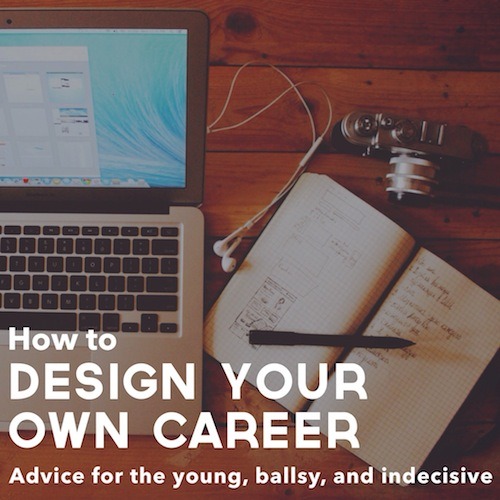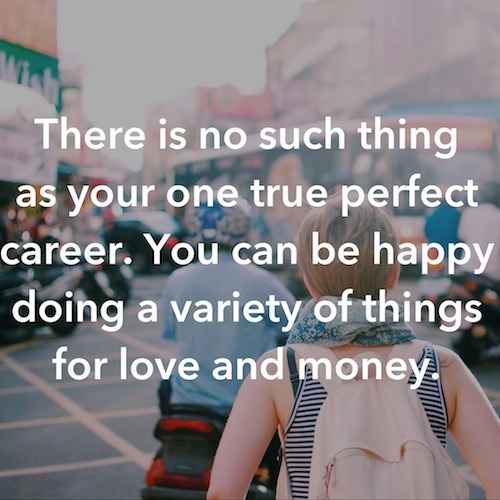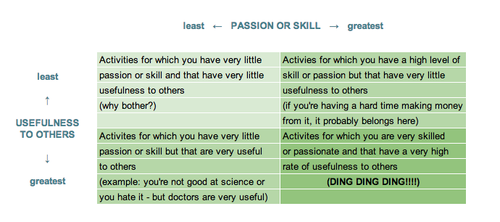Okay so if you didn't know the last couple of months have been a HUGE change for me. I got a promotion at work, I moved into my very first place all by myself and I adopted a 2 year old Golden Retriever named Brinkley. On top of that I know that the next 12 months are going to be amazing. I can just sense some of my best years coming on and I can't wait. So in the mix of all of that I think I have finally made a decision about what I want to do as a career. It's funny because it's something that people have been telling me since I was like 10 years old that I should do. It's still in the works so I promised I wouldn't say anything to anyone yet until we figure out more. But while I was over checking to see if Megan had posted anything recently I was pumped to read her newest post and I thought it might be helpful for some of you since it goes along the lines of career's. Have a great weekend!! XO, Erica
How To Design Your Own Career
Advice for the young, ballsy, and indecisive.

I’ve received a lot of questions from readers lately about careers and jobs, mostly from those in high school, college, or recent graduates. The questions take many forms and specific topics, but the underlying panic is:
"What the hell should I do for a career?!"
Some people seem to know innately what they were born to do, and forge ahead accordingly. Meanwhile, others struggle with the big life decision of settling on a career path. I’ve been on both sides of this coin. I’m only in my late twenties and still figuring things out myself, so I don’t suggest that I have all the answers - but I have learned a few things along the way.
Here are my words of advice, along with a few tools and resources that might help if you’re feeling stuck, indecisive, or anxious about the pressure to Choose Your Perfect Career.
First of all, though, let’s agree on one thing:
The concept of a “perfect career” as we commonly think of it is bullshit. It contains the romantic, narrow, and dangerously incorrect notion that there’s only type of job, profession, or career that you will ever be happy in.
Throw away the fairy tale.
There are no such thing as soul mates, and there is no such thing as your one true perfect career. You can be happy doing a variety of things for love and money.(click to tweet)
I held onto this belief for way too long. From a very young age I believed with full conviction that the life of a gallery-represented painter was the only career that would make me happy, and my ability to achieve this was the only measure by which I could consider myself successful (I know, heavy right?). I drowned my creativity under waves of pressure and perfectionism, trying to live up to my own lofty expectations in an intensely competitive and completely nonsensical market. Thankfully, I was able to dig myself out of this, with my love of painting fragile but intact, and my sense of self sharpened.
Chances are you’ve been trained to think very singularly about “what you want to do for the rest of your life.” You’ve been (or will be) asked to choose a major in college, maybe even put through lessons and too many extracurricular activities and given aptitude tests. And yes, to get through a college education you will need to choose a major and place your bets on a particular course of action. But the truth is, you are a dynamic, multifaceted being with so many potential directions. You will do many things in life, go down many roads you can’t even foresee right now. And what specific topic you choose to study in college really, honestly, will not matter in the long run, in most cases.
What does matter is what you choose to do with your unique matrix of interests, useful skills, and knowledge. I believe firmly in the concept of designing your own career path. Not everyone has the same path towards the same job (I’m a former painting major now working in social strategy at an advertising agency, for example), and the landscape changes every day. When I was in school, and for even a few years after, the job I have now didn’t even exist.
An entrepreneurial attitude to your career and life is no longer optional. There is no longer a blueprint to follow. You’ve got to make your own way.
"Great! Except… I have no idea where to start."
If you weren’t blessed with a strong passion or career direction early on in life, please know that you are in fact, quite normal. You probably even hold the advantage - you’re open to many things early on (remember how my initial passion turned out to be quite narrow?). At this stage, it’s a good idea to do some research - about yourself. You are always changing and growing, so no matter where you are in your career, it’s always helpful to check in and get to know you a little better. In my experience, there’s no better way to do this than to put pen to paper.
1. If you want to know yourself, start writing.
Guided writing exercises and workbooks were most helpful to me when I broke free of the idea that there was One True Thing I was supposed to do in life. At that point, 3 years out of college, the girl who always knew what she wanted to do with her life found herself squarely on her ass, unemployed in a new city, wondering anxiously what was next.
Books can help you, and even give you a somewhat false sense of productivity, but nothing helped more than digging up my own words and arranging them on paper in a way that made sense. It’s totally a metaphor for what’s going on inside you - a jumble of confusion, the right parts are there somewhere but out of order. In a very real way, writing helps put the puzzle pieces together.
I spent a lot of time reading and poring through books, digital downloads, and countless articles online, but nothing helped guide me through this messy, transformative process like The Desire Map by Danielle Laporte.
Because of the writing exercises and guidebooks I found in The Desire Map, I came out on the other side a little clearer, and with a firmer understanding that how I want tofeel every day should be at the core of these important life decisions. Once you know this, you have your very own proverbial North Star to guide you in countless ways.
(Full disclosure: if you click the link above and decide you want to try The Desire Map too, I’ll receive a small percentage of the sale - but please know I would never endorse something I didn’t use and love myself. In fact, I purchased The Desire Map years ago and still refer to the scribbled notes I took in it frequently.)
And if you already have a passion, and are sure you know what you want to do, great!
As you get older and more experienced, be open to letting that unfold and evolve. I clung desperately to this narrow idea of what I was supposed to do with my life mostly out of fear. Everyone my whole life expected me to become a successful artist, and I’d seen so many people give up along the way — the last thing I wanted was to be seen as giving up too. But after a while, I realized I’ll always be an artist so long as I keep painting, external recognition be damned - and anyone who thinks otherwise can jump in a lake. Plenty of successful artists hold down day jobs, and many even keep them when they don’t need the money because they like them and find them fulfilling. It doesn’t have to be so black and white.
Which leads me to my second piece of advice…
2. If you want to understand how others have done it, stalk people on LinkedIn.
When I was “squarely on my ass” and unemployed with no direction, the reason I figured out what kind of careers might be a good fit for me is I incessantly stalked people on LinkedIn.
Get on LinkedIn if you’re not, and search for people who started from similar places.It’s not hard to reverse-engineer their career paths. How did they move from one job to another? The more digital-savvy of them will have very complete profiles that easily allow you to examine how they got from A to B, or what traits or job responsibilities helped them pivot from one industry or role to another if something wasn’t working for them.
LinkedIn recently even launched a tool called Field of Study Explorer to make your stalking/reverse-engineering even easier. Check it out in their new blog post (well worth a read all on its own), "Does Studying Fine Art = Unemployment? Introducing LinkedIn’s Field of Study Explorer."
A writer for Mashable also tested this idea, working with LinkedIn’s data science team to find his “future self” among other LinkedIn users with a similar background: "How LinkedIn Found My ‘Future’ Self."
In my case, there were several people who unknowingly helped me understand what my possibilities were, but one in particular later became my friend. One day while searching for profiles and jobs on LinkedIn, I saw that a fun-looking woman around my age named Elysa had attended my university for a graphic design degree and worked her way from designer to well-known leader in the field of digital strategy (and asuccessful blogger to boot!). She was kind enough to meet me for coffee on her way to a speaking engagement at SXSW. I learned so much from that one conversation — as a jobless 25 year old, I understood at that point that the only thing separating me from progress was myself.
The only thing was, I still needed to figure out how to make money from what I’d discovered with The Desire Map.
Remember that unique matrix of useful skills, interests, and knowledge I mentioned earlier?
3. Well, here it is:
Click here to use this Google Sheet for yourself: http://bit.ly/gridtoolmv
It’s critical to remember that if you want to make money at something, it has to be useful to others. This very basic principle applies whether you’re someone’s assistant (no shame here, I’ve done it!) in which you are selling your organizationalservices in exchange for benefits and a salary, or you’re a gallery painter selling theproduct of artwork that brings real joy to its new owners.
To understand these transactions as anything else (I’m just an employee! I’m not selling anything or, I’m not selling a product - how dare you, I’m an artist!) is to not fully understand business or the real world, or as Ramit Sethi calls it, the game being played around you. And the sooner you get on board with this concept, the better equipped you’ll be to find a career that both makes you happy and makes you money.
My very sincere advice would be to think long and hard about what you enjoy doing (even just hobbies - doesn’t have to be “job-like”) and what you’re naturally skilled at (things like “being a good listener” and “talking to people about their problems” totally count here, by the way) and compare that to what you think might actually be useful to random people you don’t know. Put more simply,
What are you good at or enjoy doing that solves other people’s problems?
Start there. With some soul searching, writing, and very realistic analysis, you’ll find yourself starting down a path to a long, lucrative career path that is uniquely yours, fun, exciting and never static.



No comments:
Post a Comment